Emotional Intelligence
“When I compared star performers with average ones in senior leadership positions, nearly 90% of the difference in their profiles was attributable to emotional intelligence factors rather than cognitive abilities.”
-Daniel Goleman, “What Makes a Leader?”
Harvard Business Review, from research at 200 global companies
Emotional Intelligence
“When I compared star performers with average ones in senior leadership positions, nearly 90% of the difference in their profiles was attributable to emotional intelligence factors rather than cognitive abilities.”
-Daniel Goleman, “What Makes a Leader?”
Harvard Business Review, from research at 200 global companies

Emotional intelligence
Why Develop Emotional Intelligence?
Research reveals emotional intelligence is the hidden ingredient in star performance, and the best predictor of success. Emotional and social intelligence is the differentiating attribute between highly effective leaders and average ones.
Why do smart people fail?
Have you known of highly competent, experienced, well-educated individuals who fail to reach expected or desired outcomes? Unable to get things done through others? Unable to lead and influence others effectively? Yet they are described as very smart and highly competent.
What is a competency?
A competency is any measurable characteristic of a person that differentiates level of performance in a given job, role, organization, or culture.
We know that there are two types of competence:
- Cognitive or technical competence
- Emotional competence
New and compelling research in neuroscience provides greater insight into how our brains operate and affect decision making, behavior, relationships with others, and performance. Studies have proven that business performance is critically dependent upon the individual’s ability to successfully manage themselves, their behavior and their relationships. According to research conducted by Hay/McBer, Daniel Goleman, Ph.D. author of “Emotional Intelligence” and “Working With Emotional Intelligence”, Richard Boyatzis, Ph.D. and others:
- Emotional Intelligence is found to be twice as important as any other factor in predicting outstanding employee performance, accounting for more than 85% of star performance in top leaders.
- Emotional Intelligence has a major impact on organizational performance, doubling and even tripling productivity, and greatly improving bottom line results.
- Emotional Intelligence can be developed and enhanced through assessment, behavioral training and coaching.
Research, Performance and EI
In a well-known study by Richard Boyatzis at Weatherhead School of Management / Case Western Reserve University, of 2000+ executives, middle managers and supervisors from 12 different organizations, it was found that of the 16 abilities that distinguished stars from average performers, all but 2 were emotional competencies. A larger analysis duplicated these results when the distinctive qualities of star performers were examined across 286 organizations. Two-thirds of the staff was in the US and one-half in 20 other countries.
Of 21 generic competencies, all but 3 were based on emotional intelligence. Of the other 3 purely cognitive competencies, 2 were intellectual: analytic skills and conceptual thinking. The third was technical expertise. The vast majority – more than 80% – of general competencies that distinguished superior from average performers depend on emotional intelligence.
-Lyle Spencer, Jr. at Hay/McBer
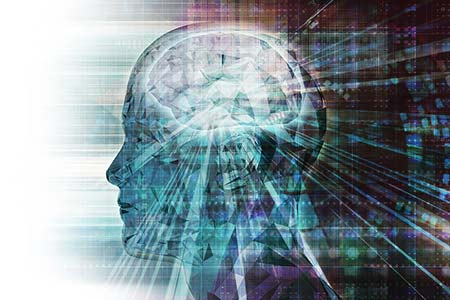

Why is this important for leaders?
Differentiating Competencies – Star Performance
Emotionally intelligent leadership delivers results. Research has confirmed a significant performance gap between leaders who display the qualities of emotional intelligence and those who don’t. For success in leadership positions, emotional and social competence accounts for virtually the entire advantage.
Studies of 15 global companies and US Government organizations, reported by best-selling author Daniel Goleman, Ph.D., in Working With Emotional Intelligence and in Harvard Business Review reveal that productivity has been shown to double and even triple with the development of emotional intelligence.
“McClelland (David) found that when senior managers had a critical mass of emotional intelligence capabilities, their divisions outperformed yearly earnings goals by 20%. Division leaders without that critical mass underperformed by almost the same amount.” Daniel Goleman, What Makes A Leader? Harvard Business Review
Leaders influence others in one of two directions: Toward positive actions and behaviors for themselves and the organization’s mission, or, away from actions and behaviors for success. There is no neutral. There is no middle ground. There are differentiating attributes in leaders that consistently result in influencing a positive, high-value direction.
“We found that of all the elements affecting bottom-line performance, the importance of the leader’s mood and its attendant behaviors are most surprising. That powerful pair set off a chain reaction: The leader’s mood and behaviors drive the moods and behaviors of everyone else.”
“Moods that start at the top tend to move the fastest because everyone watches the boss. They take their emotional cues from him (or her). Even when the boss isn’t highly visible – for example, the CEO who works behind closed doors on an upper floor – his attitude affects the moods of his direct reports, and a domino effect ripples throughout the company.”
– Daniel Goleman, Richard Boyatzis, Annie McKee, “Primal Leadership, The Hidden Driver of Great Performance”, Harvard Business Review, Dec. 2001
Why Now?
Organizations today are in the grip of continuous change. The new economy has ushered in an era of unprecedented change and transformation. Restructuring, reorganization, re-engineering, increasingly demanding customers, continuous improvement, information overload – uncertainty about the future; we are experiencing the most complex working environment in history. Every day employees face greater pressures and challenges than ever before.
“We’re just beginning to realize how economically valuable emotions are, and it’s clear that they’re largely out of control. Analysts have started to downgrade companies – such as Walmart and the Home Depot – whose cultures, they believe, are eroding, even if their earnings are holding up.”
– Marcus Buckingham (author of “First Break All the Rules”), “Idea Fest”, Fast Company, Jan. 2003.
What’s it costing you?
Ok, we’re not telling you anything new . . . most will say they’ve seen this for themselves in organizations. But perhaps you haven’t considered the latest research on human response to these factors. Research in the field of Neuroscience has revealed that when a person is experiencing stressful emotions such as uncertainty, fear, frustration or anxiety, all neural action (learning, memory, cognition and problem-solving) is adversely affected. Our brains become less efficient in accessing creative or strategic thinking. Emotions can literally create a desynchronization in brain function, affecting performance at all levels.
Sound familiar?
New traits are needed to thrive and succeed. Competencies manifested in star performers are the competencies of emotional intelligence. The emotional competence framework below presents these competencies as applications of “awareness” and “actions” to oneself and to others.
Science has proven that as pressure and stress increase, our capacity to perform (think rationally and intelligently) is compromised. Core competencies can collapse in a heartbeat.
- Perceptions become skewed and emotional reactivity is displayed
- Ineffective (often reactive) decision making increases
- Strategic perspective is lost
- Communication breakdowns occur and teamwork is fractured
- Effective listening is compromised
- Internal and external customer service quality is adversely affected
- Stamina and energy are depleted
- The fuel of optimism and positivity goes dry
- Quality breaks down in a domino effect: loss of focus, lowered productivity, higher inefficiency, low morale, higher turnover and absenteeism, poor customer service, increased costs, lower profits and shareholder value.
What is Emotional Intelligence?
Emotional Intelligence is the capacity for recognizing our own feelings and those of others, for motivating ourselves, and for managing emotions effectively in ourselves and in others.
It describes the behaviors that sustain people in challenging roles, or as their careers become more demanding, and it captures the qualities that help people deal effectively with change.
The abbreviations EQ (Emotional Quotient) or EI are often used to refer to Emotional Intelligence.
Emotional Competence Framework


Investing in development that differentiates performance
Our programs teach leaders and teams highly-effective approaches and scientifically-validated tools to improve and sustain high performance . . . . and it can be measured.
Sustained Performance Improvement
If the objective of your development initiative is sustained improvement, skill building in emotional intelligence competency is essential to long-term success. Educating your people ‘about’ emotional intelligence is worthwhile; however, providing a skill development program will deliver lasting results. Building these skills requires a larger time investment than, for example, technical training; however, the return on the investment is high and multiplicative.
“Organizations must refocus their training to include the limbic (emotional) system. They must help people break old behavioral habits and establish new ones. That not only takes much more time than conventional training programs, it also requires an individualized approach. It’s important to emphasize that building one’s emotional intelligence cannot – will not – happen without sincere desire and concerted effort. A brief seminar won’t help. It is much harder to learn to empathize than it is to become adept at regression analysis. But it can be done.”
-Daniel Goleman, “What Makes A Leader?”- Harvard Business Review, Nov/Dec 1998
Why this program is successful for organizations
Our method is focused on creating sustainable results through a process that typically results in an 85% transfer of learning as compared with the usual 15 – 20% achieved in most “soft skills” management training. We utilize a comprehensive approach, for a valuable ROI. Click here to read Client Impact and Testimonials.
First, we work with you to understand your short and long-term objectives
- We want to understand the presenting issues and needs and the desired outcome.
- We want to understand how you want to measure benefits and results.
- We want to understand the existing culture and organizational values as well as any relevant history. Your organization’s core values and guiding principles will be integrated into the program and materials.
- We want to understand your existing business goals and identify alignment with the program.
- We want to understand your current performance competency model(s) and identify alignment.
We utilize an individualized approach
 All comprehensive learning and development programs include:
All comprehensive learning and development programs include:
- One-on-one interviews – Each participant has a confidential, face-to-face meeting with the facilitator. In this session they identify their individual goals and objectives to be addressed in the training, as well as their comments on desired organizational and / or team improvements. Each person then utilizes our Individual Goals & Progress Journal and is guided to identify their specific behavioral goals to be achieved in applying what is learned in the program, along with progress measurements.
- Individualized coaching sessions – Because all participants in a learning program are individuals with their own strengths and challenges, we provide individual coaching to maximize the application of learning to their own, individual performance goals. Coaching by phone and in-person accompanies the workshop sessions to reinforce skill development that is specific to the behavioral goals of each individual.
We focus on tools and practical application – beyond theory
- Interactive workshop sessions focus on learning tools and techniques that are directly applied to real workplace situations and challenges, and many are also utilized by participants in their personal lives. Experiential and action-learning activities enable integration of the learning for faster transfer to behavior modification.
- Individualized coaching sessions by phone and in-person accompany the workshop sessions to reinforce skill development.
We apply pre and post measurements
Pre and post assessments for the individuals, team,
or organization are selected to measure:
- Emotional intelligence competencies
- Productivity, ability to focus
- Job satisfaction, intent to leave
- Social attitudes, relationships at work
- Goal clarity
- Communication effectiveness
- Confidence in the organization; outlook
- Perceptions of management
- The working climate; self-expression
- Team effectiveness
- Role clarity
- Organizational coherence
- Stress symptoms
- Psychological well-being
Pre-program participant survey –
A survey questionnaire specifically designed for your organization and/or team is distributed to each participant and other key individuals to gather confidential input. The collective responses are studied by the facilitator and the training format is structured to focus on key issues. Based on indicators in the survey, we provide additional recommendations to your organization.
Post training participant survey –
Approximately 45 days post program, each participant completes a post-program questionnaire consisting of several of the questions asked on the pre-program questionnaire, along with questions about how the tools learned are impacting their day-to-day performance effectiveness. We provide a pre/post comparative and program summary report to your organization.
Emotional Intelligence Program Phases and Processes
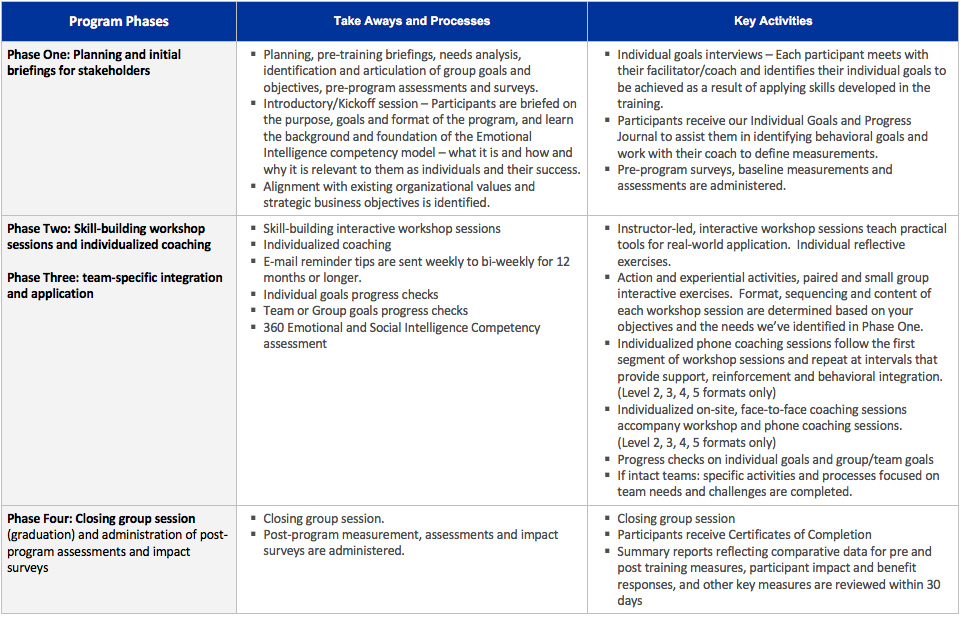
Emotional Intelligence Development Programs
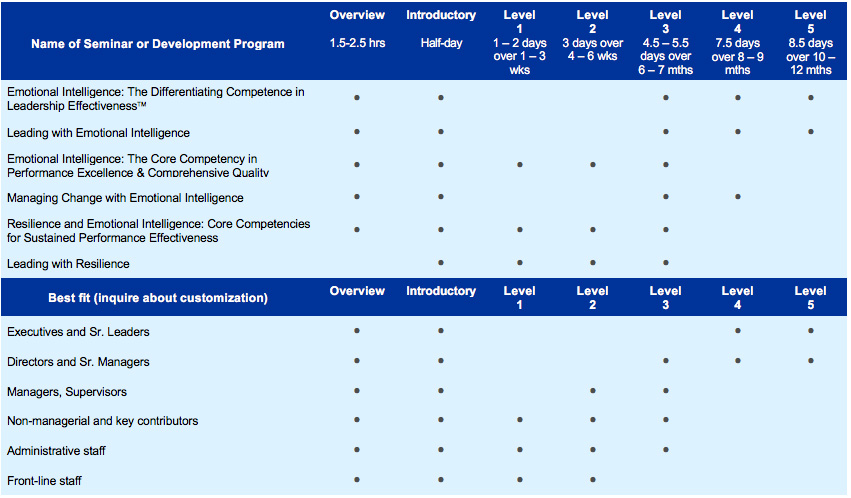
Features and Program Formats
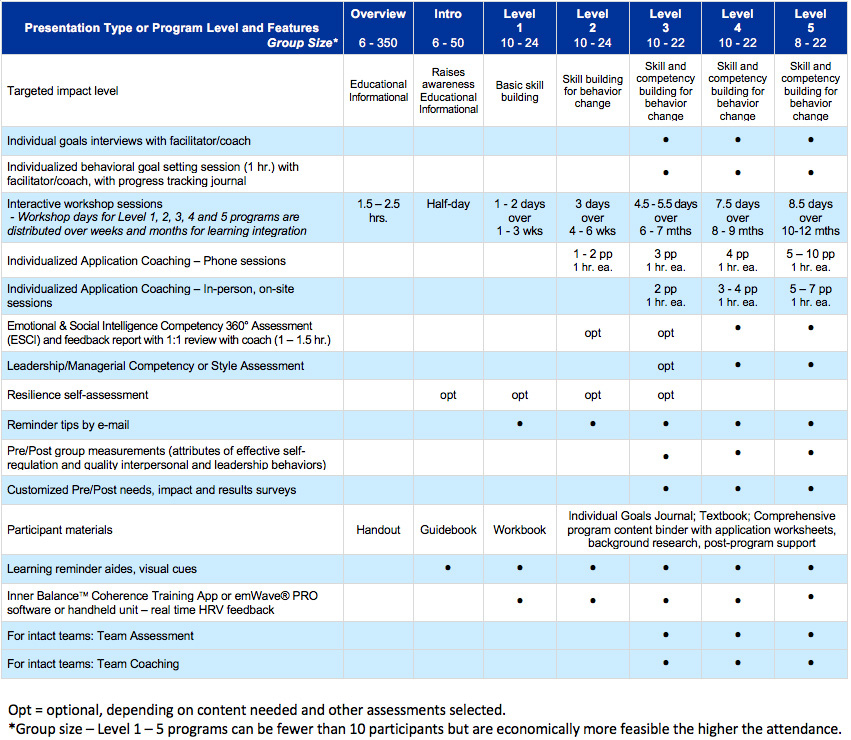
Overview Presentation – Interactive
Length: 1.5 – 2.5 hours
Impact: Educates and informs, introduces concepts, stimulates thought, raises awareness.
Introductory Workshop – Interactive
Length: half-day
Impact: Educates, informs and raises awareness through guided exercises and discussion with application of 1 – 2 tools. Participants receive a self-directed practice guide for self-awareness tools.
Level One –
First-level skill-building workshops
Length: One to two days consecutive or over one to three weeks. Alternatively 1 full day + 2 half-days.
Impact: Learn and practice 1 – 4 tools toward Level One behavior modification focused on self-awareness, self-regulation, and resiliency.
Level Two –
Skill-building programs with 1 to 2 individualized application coaching sessions by phone.
Length: 3 days, distributed over 4 – 6 weeks
Impact: Learn, practice and apply 4 – 5 tools for building resiliency and behavioral impact in foundational EI competencies of Self-awareness and Self-management and introduction to Empathy.
Optional components: 360 degree Emotional and Social Intelligence Competency assessment, feedback report and in-person feedback review session.
Level Three –
Skill and competency building programs with individualized goal setting and coaching consisting of 3 phone-coaching and 2 in-person coaching sessions.
Length: 4.5 to 5.5 days distributed over 6 to 7 months
Impact: Learn, practice and apply 6 – 7 tools for measurable behavioral impact in foundational and intermediate skill levels in Self-awareness, Self-management, Empathy and Social Skills.
Includes individualized behavioral goal setting with facilitator, and progress tracking.
Optional components: continuation of coaching sessions, half-day follow-up reinforcement session, 360 degree Emotional and Social Intelligence Competency assessment, feedback report and in-person feedback review session.
Level Four (Leadership) –
Comprehensive skill and competency building programs with behavioral integration. Includes individualized goal setting and coaching consisting of 4 phone coaching and 3 to 4 in-person coaching sessions.
Length: 7.5 days distributed over 8 – 9 months
Impact: Learn, practice and apply 8 – 9 tools for measurable behavioral impact in foundational and higher-level level emotional intelligence competencies, including relationship management competencies (social skills).
Includes individualized behavioral goal setting with facilitator and progress tracking, 360 degree Emotional and Social Intelligence Competency assessment, feedback report and in-person feedback review session.
Optional: continuation of individualized coaching process.
Level Four T (for intact, cross-functional and executive teams) –
Same as Level Four above with specific focus on establishing higher levels of team coherence. Includes experiential and action learning activities. Team EI and team effectiveness attributes are measured and tools for improvement are practiced by the team using real, current business issues.
Level Five (Leadership) –
Comprehensive skill and competency building programs with behavioral integration. Includes individualized goal setting and coaching consisting of 5 or more phone coaching and 5 or more in-person coaching sessions.
Length: 8.5 days distributed over 10 – 12 months.
Impact: Learn, practice and apply 10 – 12 tools for measurable behavioral impact in foundational and advanced-level level emotional intelligence competencies, including specific leadership effectiveness and relationship management competencies (social skills).
Includes individualized behavioral goal setting with facilitator and progress tracking, 360 degree Emotional and Social Intelligence Competency assessment, feedback report and in-person feedback review session; leadership style assessment.
Optional: continuation of individualized coaching process.
Level Five T (for intact, cross-functional and executive teams) –
Same as Level Five above with specific focus on establishing higher levels of team coherence. Includes experiential and action learning activities. Team EI and team effectiveness attributes are measured and tools for improvement are practiced by the team using real, current business issues.
Building an Emotionally Intelligent Organization or Team
Informing or skill building: Where should you begin?
Informing and Introducing
- Raises awareness
- Individual ownership begins
- Stimulates desire for more
- Good first step
Does not result in significant, if any, behavior change or measurable performance improvement
Skill Building
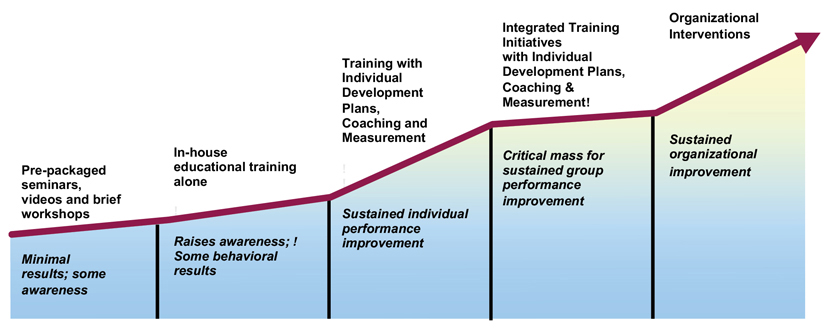
Example: feedback collected 45 days after Level 4 program
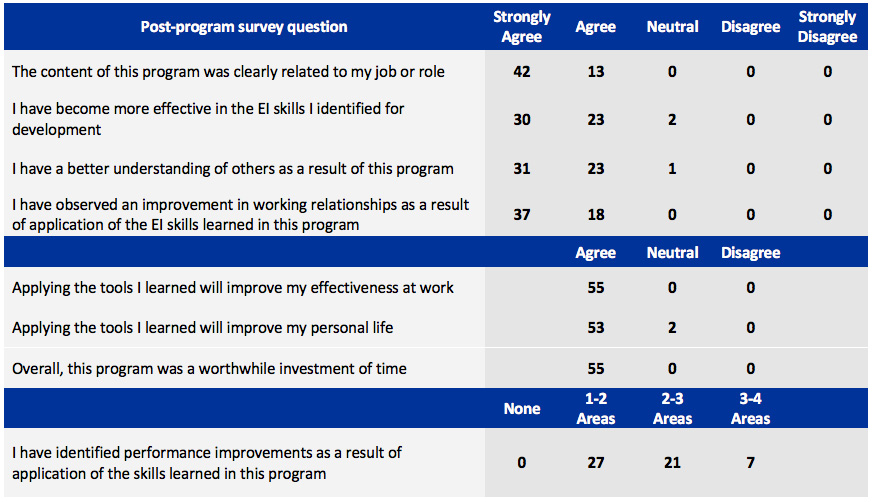
n=55; CEO, Executive Team, Sr. Leadership Team, Directors, Team Leaders; 45 days post-program.
Emotional Intelligence Assessments
We utilize 360° emotional intelligence and social intelligence assessments which provide precise and focused feedback about individual strengths and specific competencies where development is needed. Development guidelines for 12 competencies are provided to indicate where focus is needed for behavior change to enhance one’s emotional intelligence and overall performance. Feedback from the assessments provide data on the behaviors that matter and is applicable to any leadership or professional role.
Emotional and Social Competency Inventory (ESCI)
ESCI Group Report – Composite of multiple individual ESCI individual reports
Coaching
Professional coaching in the development of emotional and social competencies will assist leaders and those identified as high potentials to strengthen and develop core competencies that measurably enhance the performance and expand the organization’s capacity for growth.
As part of our skill-building learning programs for organizations: Coaching is a fundamental element of the learning process in our Level 2, 3, 4 and 5 programs. Participants meet individually with the facilitator in person and have telephone coaching sessions are scheduled intervals that support the workshop learning sessions.
Individual coaching for development of emotional and social competencies is available to leaders, key contributors and professionals seeking to learn how to become more effective in their self-leadership and relationships with others.

